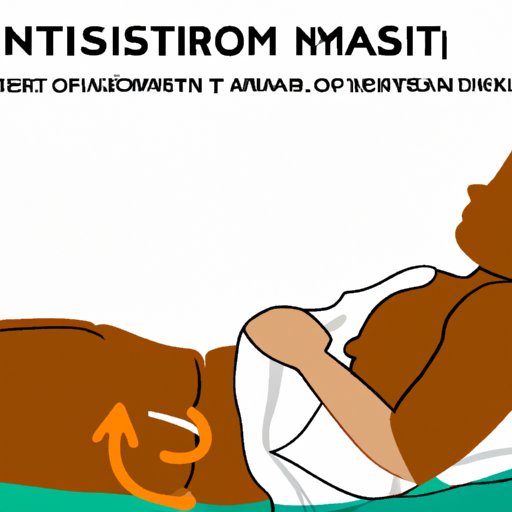Introduction
Bed rest is a period of time in which an individual avoids physical activity or movement. It is typically recommended by medical professionals for those experiencing certain health conditions or illnesses such as pregnancy complications, heart disease, and surgery recovery. While bed rest can have beneficial effects on overall health, it can also have a negative impact on the abdominal system. This article will explore the effects of bed rest on digestion and abdominal health, as well as abdominal pain.

Examining the Impact of Bed Rest on Digestion and Abdominal Health
It is important to understand the functions of the abdominal system in order to comprehend the potential effects of bed rest. The abdominal system is composed of the organs responsible for digestion and nutrition such as the stomach, intestines, liver, and pancreas. These organs work together to break down food, absorb nutrients, and eliminate waste from the body.
Effects on Gastrointestinal Function
One of the primary effects of bed rest on the abdominal system is its impact on gastrointestinal function. Prolonged periods of inactivity can lead to slowed digestion, particularly in the small intestine. This can result in a decrease in nutrient absorption and an increased risk of constipation. Additionally, the lack of physical activity associated with bed rest may reduce the production of gastric juices and hormones, resulting in decreased appetite.
Possible Increase in Risk of Irritable Bowel Syndrome
In addition to slowing digestion and decreasing appetite, bed rest may also increase the risk of developing irritable bowel syndrome (IBS). IBS is a chronic condition characterized by abdominal pain, bloating, gas, and changes in bowel habits. Studies have found that individuals who spend extended periods of time in bed are more likely to develop IBS than those who remain physically active.
Investigating the Link Between Bed Rest and Abdominal Pain
In addition to digestive issues, bed rest can also cause abdominal pain. There are several factors that may contribute to this type of pain, including changes in muscle strength and alterations in nutrient absorption.
Changes in Muscle Strength
Prolonged periods of inactivity can weaken the muscles of the abdominal wall, leading to abdominal pain. Muscles that have been weakened due to bed rest may be unable to support the abdominal organs, resulting in discomfort and pain.
Alterations in Nutrient Absorption
Bed rest can also lead to changes in nutrient absorption, which can cause abdominal pain. When the body is not able to adequately absorb nutrients, it can lead to malnourishment, which can cause painful cramping and other digestive issues.
Conclusion
Bed rest can have a significant impact on the abdominal system, including digestion and abdominal health, as well as abdominal pain. Prolonged periods of inactivity can lead to slowed digestion, decreased appetite, increased risk of irritable bowel syndrome, weakened muscles, and alterations in nutrient absorption. It is important for those engaging in bed rest to take steps to mitigate these effects and maintain optimal abdominal health.
Summary of Findings
This article has examined the effects of bed rest on the abdominal system. It has explored how prolonged periods of inactivity can lead to slowed digestion, decreased appetite, increased risk of irritable bowel syndrome, weakened muscles, and alterations in nutrient absorption.
Recommendations for Managing Bed Rest-Related Abdominal Problems
Those engaging in bed rest should take steps to manage any abdominal-related issues. It is important to ensure adequate hydration and nutrition, as well as engage in light physical activities when possible to maintain muscle strength. It may also be beneficial to speak with a medical professional about any abdominal pain or other symptoms that may arise.


